Procter -v-Procter [2021] EWCA Civ 167
The Court of Appeal determined in the above case that a tenancy at will protected by Agricultural Holding Act 1986 existed.
In this case, various members of the proctor family owned a large estate in Yorkshire, which was held as a partnership.
The freehold title of the property had been held by trustees of a will trust with the identity of trustee changing at different times.
The partner of the farm also changes hand over time and it was clear there was overlap between the trustee of the will trust and the acting partners of the partnership.
At one stage the farm contained 5 partners, being two parents and their three adult children (A, B, C, D, E) and at the same time, the trustees of the will be the two parents and one of their children (A, B, C).
Out of the various disputes that arose, one concerned the nature of the partnership’s interest in the farmland and in particular, whether the partnership had a tenancy of the land.
In this case, if it were proved that the freeholder had let the land to the partnership, they would need to show that they enjoyed exclusive possession to the land, an important test that must be met.
Exclusive Possession.
Exclusive possession means the right of the tenant to exclude others from the property including the landlord, from the property – the tenant in effect is exercising the right as if he were the absolute owner of the property.
In this decided case, it was found that A, B & C had held the freehold as trustees at the same time that persons A, B, C, D and E had been partners in the farm business.
The decision
The court of appeal reversing the decision of the high court held that all partners of the partnership of the farm were the tenants of the freeholder trustees pursuant to an implied tenancy, which had arisen through the parties’ conduct over a long period of time.
The Judge held that applying Street v Mountford, he would have inferred a tenancy from the conduct of the parties, if it had not been the partial overlap between the parties.
The judge held that the overlap, in this case, meant that there could be no tenancy in these circumstances unless there is a written instrument within the scope of section 72 Law of Property Act 1925.
Our Previous Articles:
- Can A Claim Under The Inheritance Act Supersede Divorce Settlements?
- How To Protect Assets In A Divorce
- 5 Tips On How To Ensure That Your Digital Assets Are Included In Your Estate Planning
The information given here is intended for general information purposes only and should not be taken as legal advice.


